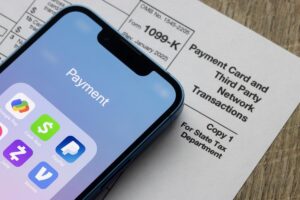Understanding Cash App Taxes: Key Insights for Your Financial Year
As tax season approaches, many users of Cash App may find themselves facing unexpected requirements – particularly the arrival of Form 1099-K. This form must be filed by those who utilize Cash App for business payments, and it is crucial for accurately reporting your income to the IRS and your state tax authorities.
What is Form 1099-K?
Form 1099-K is specifically designed to report payments received through third-party networks like Cash App, PayPal, and Venmo. If you’ve engaged in transactions using one of these apps during the previous tax year, it’s vital to understand how these income reporting requirements could impact you.
Taxable Income: What You Need to Know
If you used Cash App or similar payment applications to handle personal transactions, like splitting bills with friends or family, fear not—these exchanges usually aren’t taxable. However, if you received payments for goods or services via Cash App, you might be required to report this income.
The threshold for receiving a 1099-K form has changed in recent years, which could mean more tax obligations for you. For example, for the 2024 tax year, the reporting threshold is set at $5,000 for business payments. If you surpass this amount and have a business account, you can expect to receive a 1099-K, which you must include in your federal and state tax returns.
Types of Transactions: Business vs. Personal
To help clarify your reporting obligations, here are some examples of transactions:
Business Transactions:
- Receiving payments for freelance writing or graphic design services.
- Income from selling crafts or artisanal goods.
- Transactions involving sales of furniture or other items for profit.
- Payments received for personal services like dog walking or cleaning.
Personal Transactions:
- Money received from friends for shared dinners.
- Funds exchanged for used goods sold below their original price.
- Payments from roommates for rent or shared utilities.
Typically, transactions made through personal Cash App accounts shouldn’t appear as taxable unless they involve business activities. Remember, using a personal account for business transactions violates Cash App’s terms of service, which could lead to your account being locked.
Turning Awareness into Action
With changes introduced through the American Rescue Plan, the reporting requirements have evolved significantly. Originally set at $20,000 for the 2023 tax year, the threshold was lowered to $5,000 for 2024 and will plunge further to $600 in 2025. Additionally, be aware that some states may implement their own thresholds, which may differ from IRS requirements. California, Massachusetts, and Maryland, for example, have varying rules that might require different reporting practices.
It’s essential to keep diligent records of all transactions, whether they are personal or business-related. If you accidentally used a business account for personal transactions, the IRS provides guidance on how to correctly report these, either by adjusting your income on the applicable forms or reporting the loss appropriately.
When In Doubt, Seek Professional Help
The IRS’s rules can be complex, and while this overview provides a foundational understanding, individual circumstances can vary greatly. Consulting a tax professional or Certified Public Accountant (CPA) can help ensure that you’re compliant and taking advantage of any available deductions or exemptions.
Cryptocurrency Reporting
For those who also engage in cryptocurrency transactions through Cash App, separate reporting rules apply. Unlike cash payments, gains and losses from cryptocurrency require Form 1099-B. It’s important to keep your records organized, as Cash App does not include peer-to-peer bitcoin transactions on the 1099-B form, leaving the onus on you for accurate reporting.
Conclusion
As tax obligations shift and evolve with changing laws, staying informed can help you navigate the complexities of reporting income from apps like Cash App. With careful planning and professional guidance, you can ensure compliance and confidently handle your financial responsibilities. Remember, the key to proactive tax preparation starts with understanding your income sources and reporting requirements.
For more specialized insights and the latest updates on tax guidelines, keep exploring our resources at Extreme Investor Network. Your financial wellness is our mission!

